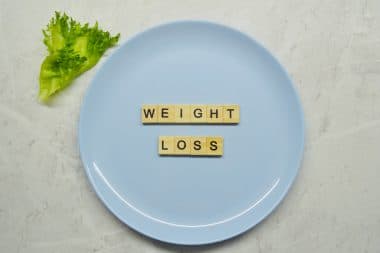Running can be a terrific way to lose weight and lean out your body. However, many people are dismayed to discover they actually gain weight from running. Here are five things to consider if you notice a weight gain from running, and how to make your running workout result in a lean, fit body.
1) Running makes you gain muscle weight.
Gaining muscle is rarely a bad thing. If your pants still fit but your body weight went up, it means that your lower body muscles are becoming more dense and toned. This is good news; more muscle means a higher basal metabolic rate and easier time burning body fat. Some runners notice their thighs and butt becoming larger and rounder, but their stomach becoming flatter and more toned.
2) Do muscle-building cross training.
Running can strengthen and grow muscles in your lower abs, butt and legs, but it can make you lose muscle in your upper body. Make sure to balance out running with upper-body resistance training. This way, you can retain more muscle mass and keep your basal metabolic rate high. Incorporate pushups, pull-ups, weight training, or rock climbing into your workout repertoire.
3) Running makes you retain water.
This is especially true when you are first starting out. Your muscles are tearing, healing and rebuilding as you push yourself up inclines and over further distances. This is a healthy and natural process, but it does require plenty of water. Your body will retain more water following an intense running workout. Drinking plenty of water can help alleviate retention. Make sure you drink plenty of water to give your body what it needs.
4) Significant weight loss requires a lot of running.
It’s easy to get inspired to run after looking at the lean bodies of star marathoners and ultra-marathoners. However, it’s important to keep in mind that regular long-distance runners clear dozens of miles each week in their training. Even if you run twenty miles a week, it simply won’t be on par with more extreme runners.
Running burns calories, but it takes a tremendous amount of running to achieve the extremely light and lean body of a long-distance runner. For the average runner, running is most effective for weight loss when paired with a healthy, low-calorie diet.
5) Running can make you overeat.
Running can work up an appetite. Many runners make the mistake of overcompensating their calories. For significant weight loss, you need to create a caloric deficit of 250 – 500 calories per day. If you eat too much following a run, you will easily gain back the calories you just burned. To be safe estimate the calories burned running with your measurements on our calculator.
Fill up on healthy foods that replenish fluids and electrolytes following a run. Pickles and vegetables are a great way to curb cravings and restock on electrolytes without eating too many calories. Drinking plenty of water after a run can also help curb your appetite.
Running is Good for Your Body
Your main goal of running may be to lose weight, but it’s important to not lose sight of the other benefits of running. Running is excellent for boosting your mood, improving sleep, keeping your mind alert, as well as improving your cardiovascular health.








Reply